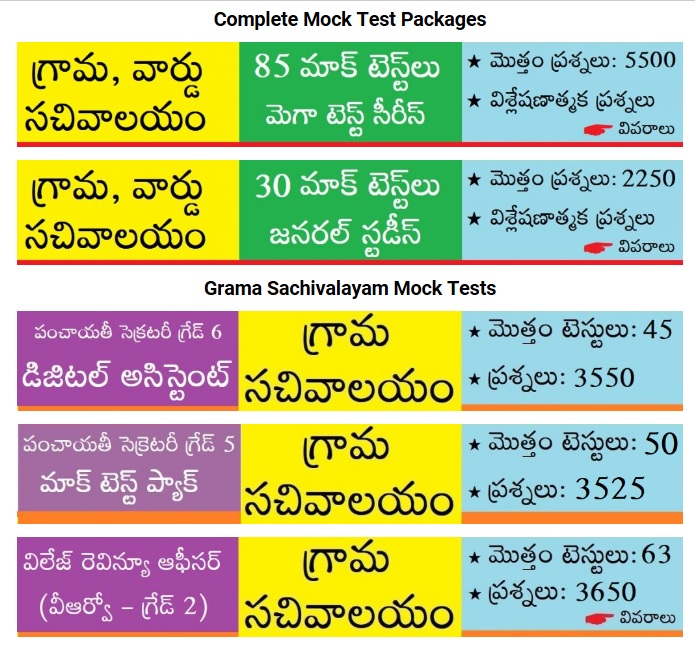Following are the previous questions with official key for Ward Sanitation and Environment Secretary exam 2019 conducted by Government of Andhra Pradesh. The old questions are useful for the understanding of nature and depth of question paper. Same syllabus is prescribed for Ward / Grama Sachivalayam exams 20202. You can also see our mock tests / online exams for all Sachivalayam exams for both Part A and Part B syllabus. See previous questions of sanitation secretary exam.
e-waste is
- environmently friendly waste
- toxic chemicals
- C and D waste
- Obsolete electronic equipment
ANSWER: 4
The least transboundary principle means
- import waste
- reduce waste
- export waste
- waste analysis
ANSWER: 2
See more previous questions: Ward Sanitation Secretary Exam Paper 2019
Which composing method requires large areas?
- Manual composting
- Mechanical composting
- open window composting
- trenching
ANSWER: 1
What are the three Rs that are used to save the environment?
- reduce, reuse, recycle
- reserve, reduce, recycle
- reuse, reserve, reduce
- reserve, reuse, reduce
ANSWER: 1
Paper, cardboard, textiles, plastics and wood are included in
- garbage
- non-combustible rubbish
- waste
- combustible rubbish
ANSWER: 4
Metals are produced as waste in industries like
- skiing
- mining
- electroplasting
- quarrying
ANSWER: 3
Which of the following improves efficiency of solid waste management?
- composting
- collection
- processing
- disposal
ANSWER: 3
Which part of Integrated Waste Management can be addressed at an individual level?
- source reduction
- recycling
- disposal
- burning
ANSWER: 1
Reticulopodia is also called
- lobopodia
- folopodia
- myxopodia
- axopodia
ANSWER: 3
Name the male frog that carries eggs in its spacious vocal sacs
- rhinoderms
- rhacophorus
- hyla
- pipa
ANSWER: 1
The enzyme that fills the gap in leading and lagging strands during replication of DNA is
- helicase
- topoisomerase
- polymerase
- ligase
ANSWER: 4
The following zooids are also called tasters
- gastrozooids
- gonzooids
- phyllozooids
- dactylozooids
ANSWER: 4
mycorrhian represents a case of
- parasitism
- symbiosis
- competition
- anagonism
ANSWER: 2
How many testicular nephridia are present in leech?
- 17 pairs
- 6 pairs
- 22 pairs
- 11 pairs
ANSWER: 4
The egg of frog is
- Alecithal
- Micolecithal
- Mesolecithal
- Macrolecithal
ANSWER: 3
New species formed from geographically isolated population is called
- sympatric speciation
- parapatric speciation
- peripatric speciation
- allopatric speciation
ANSWER: 4
The myogenic heart of pila has
- one auricle and one ventricle
- one auricle and two ventricles
- two auricles and one ventricle
- two auricles and two ventricles
ANSWER: 1
The pearl osyter pinctada belongs to
- gastropoda
- monoplacophora
- scaphopoda
- pelecypoda
ANSWER: 4
Growth curve for human population is
- j shaped
- s shaped
- bell shaped
- inverted bell shaped
ANSWER: 2
Thalassemia is also called
- aplastic anemia
- cooley’s anemia
- sickle cell anemia
- megaloblastic anemia
ANSWER: 2
The lattice model of plasma membrane was proposed by
- singer and nicolson
- danielli and davson
- wolpers
- robertson
ANSWER: 3
Trypsin sttacks interior peptide bonds on carboxyl end of the following amino acid
- tyrosine
- tryptophan
- arginine
- phenylalanine
ANSWER: 3
Identify the malarial parasite which is highly prevalent in the temparate zone?
- plasmodium vivax
- plasmodium falciparum
- plasmodium ovale
- plasmodium malaria
ANSWER: 1
Tetrad stage is found in
- leptotene stage
- zygotene stage
- pnchytene stage
- diplotene stage
ANSWER: 3
Out of the five enzyme reactions of Urea Cycle, how many reactions take place in the mitchondrion?
- one
- two
- three
- four
ANSWER: 2
Human embryonic stem cells were first isolated by
- Thompson
- Gordon
- Ruddle
- Palmiter
ANSWER: 1
The resting membrane potential of a neuron is
- – 70 mV
- + 30 mV
- + 110 mV
- – 40 mV
ANSWER: 1
With respect to the fungal sexual cycle, choose the correct sequence of events.
- Karyogamy, Plasmogamy, and Meiosis
- Meiosis, Plasmogamy and Karyogamy
- Plasmogamy, Karyogamy and Meiosis
- Meiosis, Karyogamy and Plasmogamy
ANSWER: 3
In which plant does the anomalous secondary growth develop due to the formation of accessory cambium?
- Bignonia
- Aristolochia
- Boerhavia
- Dracaena
ANSWER: 3
The term Meristem was coined by
- Hanstein
- Nageli
- Newman
- Schmidt
ANSWER: 2
Difference between virus and viroid is
- absense of protein coat in viroid but present in virus
- presence of low molecular weight RNA in virus but absent in viroid
- both 1 and 2 are same
- Absense of protein coat in virus but present in viroid
ANSWER: 1
Water potential of pure water at standard temparature is equal to
- 10
- 20
- 0
- 5
ANSWER: 3
Deficiency symptoms of an element tend to appear first in young leaves. It indicates that the element is relatively immobile. Which one of the following elemental deficiency would show such symptoms?
- sulphur
- magnesium
- nitrozen
- potassium
ANSWER: 1
The age of cycads is the
- mesozoic era
- cenozoic era
- palaeozoic era
- carboniferous era
ANSWER: 1
Eutrophication of water bodies resulting in killing of fishes is mainly due to
- non availability of food
- non availability of light
- non availability of oxygen
- non availability of essential minerals
ANSWER: 3
Bradyrhizobium type of Rhizobium refers to
- fast growth showing rhizobium
- slow growth showing rhizobium
- only developed nodules
- no participation in nodulation
ANSWER: 2
In which technique is PCR employed?
- RFLP
- RAPD
- Southern Blotting
- Western Blotting
ANSWER: 2
Which of the following is not true of a eukaryotic cell?
- It has 80-S type of ribosomes present in mitochondria
- It has 80-S type ribosome present in cytoplasm
- Mitochondria contain circular DNA
- membrane bound organelles are present
ANSWER: 1
Sickle cell anemia is an example for
- pleiotropy
- polygenic inheritance
- multiple alleles
- multiple inheritance
ANSWER: 1
Post translational modificatins take place in
- nucleus
- mitochondria
- ribosome
- endoplasmic reticulum
ANSWER: 4
For the formation of one molecule of hexose sugar, how many turns of Calvin Cycle are needed?
- 6
- 1
- 36
- 16
ANSWER: 1
Which of the following molecule can be utilised for establishing early evolutionary process?
- mitochondrial DNA
- nuclear DNA
- chloroplast DNA
- ribosomal DNA
ANSWER: 4
Which range of wavelength (in nm) is called photosynthetically active radiation (PAR)?
- 760 – 1000
- 390 – 430
- 100 – 390
- 400 – 700
ANSWER: 4
The nature of ribozyme is
- protein
- rRNA
- DNA
- hnRNA
ANSWER: 2
The enzyme that is ot found in a c3 plant is
- RuBP carboxylase
- PEP Carboxylase
- NADP reductase
- ATP synthase
ANSWER: 2
Carrageenan is present in
- phaeophyceae
- cyanobacteria
- rhodohyceae
- chlorophyceae
ANSWER: 3
During germination of barley seeds enzymes for mobilisation of reserve material to developing embryo are secreted from
- endosperm
- embryo
- aleurone layer
- embryonic leaves
ANSWER: 3
Which enzyme is an exopeptidase
- trypsin
- chymotrypsin
- pepsin
- carboxylpeptidase – A
ANSWER: 4
The following microorganism regarded as natural genetic engineer.
- bacillus thuringiensis
- agrobacterium tumefaciens
- bacillus amiloliquefaciens
- streptomyces viridochromeogenes
ANSWER: 2

